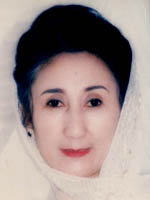|
|
||||||
|
[Home] [Timeline] [Quiz] [Women of History] [Women Helping Women] |
||||||
 |
||||||
|
Heroes |
||||||
|
|
REBIYA KADEER
A charismatic woman, she drew a lot of attention from amongst the Chinese and international women's delegates at the Conference. As a former member of the Chinese People's Political Consultative Conference and the most prominent woman among the Uighur ethnic minority in China, Rebiya Kadeer has made important contributions to promote women's rights in the country. Her contributions included the creation in 1997 of the forum - the "Thousands Mothers Movement" - which was potentially the most significant step in China since the UN World Conference on Women took place in 1995 for promoting the rights of and create employment for ethnic minority women. This initiative is particularly significant in a region, the XUAR, which is one of the least developed in China.In 1997, Rebiya Kadeer was arbitrarily deprived of her right to freedom of movement when the government confiscated her passport. She was subsequently subjected to police harassment resulting in further restrictions of her movement. These actions by the state were apparently aimed at putting pressure on her husband - a former political prisoner who was living abroad - to stop him from making public statements critical of China's treatment of the Uighurs - the majority ethnic group among the predominantly Muslim population in the region. Rebiya Kadeer was thus made a "hostage" and prevented from joining her husband and some of her children abroad. Her business activities also suffered as a result of the persecution to which the authorities subjected her On 11 August 1999, she was arrested in Urumqi, the capital of the XUAR, when she was on her way to meet a group of American visitors from the United States Congressional Research Service. She has been detained since then at Liudaowan jail, notorious for its torture and ill-treatment of prisoners. In September 1999 she was eventually charged with "providing secret information to foreigners". The charge is thought to relate to her planned meeting with members of the US Congressional Research Service group. Rebiya Kadeer is not known to have had access to any information which could be legitimately described as constituting a "state secret". Nor is she known to have been involved in any political opposition activities. Rebiya Kadeer is reportedly now suffering from poor health in prison. One of Rebiya's sons, Ablikim Abdiriyim, and her secretary, Kahriman Abdukirim, were also arrested at the same time as her. They too were reportedly accused of "providing information to foreigners" or "people outside the borders". On 20 November 1999 Ablikim Abdiriyim was assigned to two years of "re-education through labour" (an administrative punishment imposed by a government committee without charge or trial), and Kahriman Abdukirim to three years of "re-education through labour". Both men are reported to have been ill-treated in detention. On 1 November 1999, Chinese officials visited Rebiya Kadeer's home and reportedly demanded a large amount of money from her relatives, apparently to pay for Rebiya to be taken to hospital. On 4 November 1999, she was reportedly taken to hospital for a check-up but no further details about her health have emerged since. In early December 1999, a court in Urumqi examined the prosecution's case against Rebiya Kadeer, but reportedly refused to accept the case for trial and returned it to the Procuracy. 'Return of the case to the Procuracy' is a procedure often used in China when the prosecution's evidence is inconsistent or insufficient to secure a conviction, particularly in political cases. This procedure does not mean that the court has quashed the case. It means that the Procuracy has to "re-investigate" the case. In cases which are considered important, this procedure may also be used as a pretext to allow for consultation with appropriate political authorities. According to unofficial sources, Rebiya Kadeer's case has been referred to authorities in Beijing for a decision. This seems to indicate both that there is insufficient evidence against Rebiya Kadeer to convict her of the charge and that her case is considered too important to be decided upon by the regional authorities. Rebiya Kadeer is a prisoner of conscience. (Thank you to Amnesty International for this information) |
|||||
|
|
||||||

 Rebiya
Kadeer is a well-known businesswoman and mother of 10 from the Xinjiang Uighur
Autonomous Region (XUAR) in China. In 1995, she was part of China's official
delegation to the UN Fourth World Conference on Women held in Beijing.
Rebiya
Kadeer is a well-known businesswoman and mother of 10 from the Xinjiang Uighur
Autonomous Region (XUAR) in China. In 1995, she was part of China's official
delegation to the UN Fourth World Conference on Women held in Beijing.